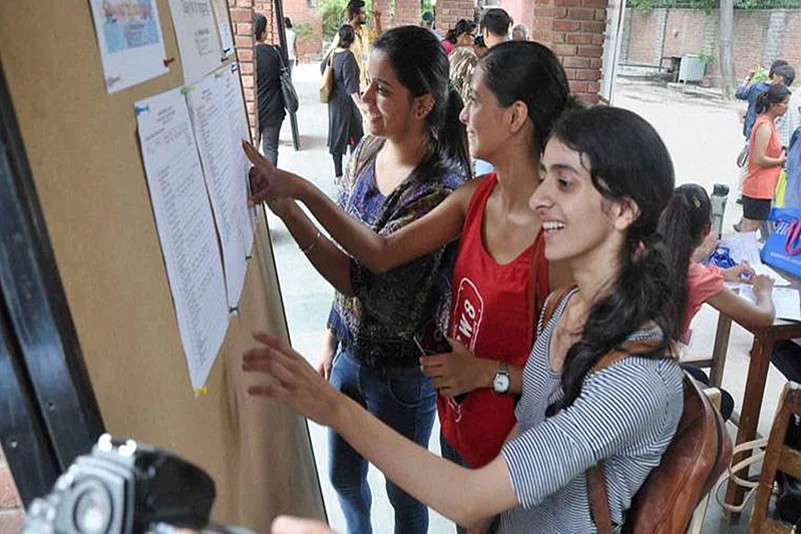Cut off marks in the first list for admission into various courses in Delhi University (DU) has gone up by at least one percentage point this year. For the first time, the Lady Sri Ram (LSR) College has pegged the cut off at 100 % for three undergraduate programmes—Psychology (Hons), Economics (Hons), and Political Science (Hons). Cut off for admission to B Com (Hons) programme is also very high with the LSR pegging it at 99.75 %. For Physics (Hons), the highest cut off is at Hindu College with 99.33%. As many as 5,500 students out of 3.54 lakh students, who have applied for admission in Delhi University, have scored perfect 100% in their four best subjects. This is not the first time when the cut off for admission in Delhi University has gone up to reach 100%. In 2015, the College of Vocational Studies and Indraprastha College had also kept the cut off at 100 % for admission to Computer Science.
Advertisement
The cut off for admission in DU has been increasing and remaining high, if not 100% always, for the past few years. Getting admission to Delhi University is tough because a significant number of students pass the Class 12 board examination with very high scores every year. Several students score 100% marks even in non-Science subjects.
But, how do students get such a high score in board examination? There was a time when getting a 70% score in the board exam was considered a big feat.
“Students are not getting these marks. They are being given these marks,” says the former director of the National Council of Educational Research and Training (NCERT) Krishna Kumar.
Advertisement
Over the years, the pattern of board examination has been changed and made it much easier for students to reduce their pressure. The multiple-choice questions and short answer questions have replaced the old system of giving questions in papers that required elaborate answers and high order thinking. The board examinations are now tests of students’ memory, not competence.
“The entire exam paper now has very specific questions that carry a few marks like 2 marks, 3 marks. If you get the correct answer you get the full marks. And the correct answer means the answer given in the textbook or the model answers. Students can mug up and answer the questions,” Kumar explained.
The evaluators, while checking the papers, allocate marks to each question based on the model answers provided to them by the secondary school examination boards.
“If the answer written by a student is exactly the way it is reflected in the model answer sheet in the hands of an evaluator, the evaluator will give full marks, “ he added.
These model answer sheets reflect the answers given in popular guide books and textbooks and are in sync with what students are taught in their schools.
“Most of the elite schools, after October, start drilling their students into such correct answering so that majority of them get high scores. Whether they understand a topic or not is not an issue,” Kumar told Outlook.
Advertisement
Many academicians say that practice of unreasonable spiking of the board examination scores by the secondary school examination boards in the name of moderation is another reason behind the students scoring high.
To bring uniformity in the evaluation process, institutions across the globe moderate the students’ scores. Moderation is required to deal with the possibility of examiners' subjectivity, compensate students for vagaries, and level up the mean achievements in the set-wise performance of the candidates attributable to the difference in the difficulty level of different sets of question papers.
“But (secondary school examination) boards use their moderation policy to inflate students’ marks. With one board inflating their students’ scores, others also follow it to ensure that their students do not suffer. How scores were moderated after board exams are never made public by the boards,” a former Education Ministry official said.
Advertisement
Following a row over unreasonable spiking of the board examination marks, the CBSE decided to amend its examination bye-laws in 2017 to scrap provision which was leading to the spiking of the board marks for the past several years.
The Union education ministry (then Human Resource Development ministry) later asked all the State education departments to follow the suit and ensure that students' scores are not inflated. In response to the ministry’s call, several States gave their assurance.
“How many boards have stopped this practice? The number of students passing the board exams with high scores continues to remain higher,” the official asked.
Advertisement
The rise in the cut off marks for admission in DU this year was not unexpected. Many academicians and Delhi University faculty members had predicted it soon after the declaration of the Class 12 board examination results by the Central Board of Secondary Education (CBSE) in July.
The results of the CBSE board examination this year was unprecedented. Of the nearly 12 lakh students, over 10.59 lakh came out with flying colours in the exam recording an overall pass percentage of 88.78 %, 5.38% higher than that of the last year. The number of students scoring 95% and above rose to reach 38,686 from 17,690 last year, reflecting an increase by a whopping 118.68 %. Over 1.57 lakh students secured 90 % and above marks, showing an increase of 67.48%. Last year, a total of 94,299 students had breached the 90 % mark.
Advertisement
The new education policy for the nation, unveiled by the government recently, provides for bringing reforms in the school examination and evaluation system but does not spell out how this would be done.
“I am sure they (government) will bring examination reforms as stipulated by the policy. But the culture will take over. Spiking of board exam scores has been going on since the 80s. A common entrance test for admission to universities and colleges is the only way to address the issue,” a former NCERT official said.




















